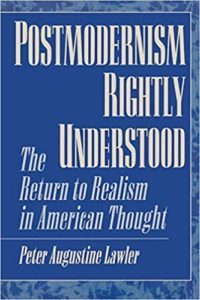Postmodernism Redefined

The cover of Dr. Lawler’s book
I am not a fan of postmodernism, at least as it is generally defined. Because of this, I have written a couple of posts (here and here) that portray it in a negative light. A frequent commenter on this blog, Jake, took issue with my negative portrayal and suggested that I read Postmodernism Rightly Understood by Dr. Peter Augustine Lawler.Since I appreciate Jake’s excellent comments and have learned from him on more than one occasion, I wanted to read the book, but it took me a while to get to it. I finally did read it last week. It was an interesting book that discussed several important authors and their ideas. Some of the authors (like Walker Percy, Alexis de Tocqueville, and Allan Bloom) were familiar to me, but others weren’t. As a result, I learned a lot and was exposed to several new ideas. However, I think the book misses the mark.
Now, of course, I am practicing philosophy without a license, while Dr. Lawler is a trained philosopher with lots of experience. Thus, you can take this criticism for what it is worth. Nevertheless, I don’t think this book is a defense of postmodernism. It is more of a discussion of anti-modernism, and based on Lawler’s obvious admiration of Walker Percy (who definitely deserves admiration), it is more a defense of Thomism.
Of course, it’s easy to get lost in the language of philosophy, so let’s make sure we are all on the same page. When it comes to philosophy, modernism suggests that we should ignore traditions (both religious and social) and the inherent biases that come with them, and we should try to judge the world critically. The more unbiased we can be in our judgments, the better. If we do that, we will be able to control our own destiny.
Dr. Lawler defines modernism a bit more narrowly:
By modern thought I mean the attempt to master or overcome nature through action directed by thought. Modern thought, roughly speaking, can be called pragmatism. The point of thought, as Karl Marx said, is not to understand the world but to change it. (p. 1)
I have no problem with that definition of modernism, and Lawler deftly shows that it is an untenable view. As a result, he says, any reasonable philosopher must be a postmodernist. That’s where I have a problem. I would say that any reasonable philosopher must be an anti-modernist, not a postmodernist.
I say this because while postmodernism is, by its very nature, difficult to define, one of its core tenets is to be very skeptical of universal meanings or universal truths. I may accept certain truths, but those truths are far from universal. Other individuals from other cultures or other backgrounds might have very different truths, and there is no way to argue whose “truths” are more or less reasonable than mine. One person’s “truths” are just as valuable as another person’s “truths.”
Dr. Lawler seems to be too good a philosopher to believe that kind of nonsense, so he chooses to redefine postmodernism. As his book’s title suggests, he thinks that the best postmodern philosophy is realism:
Realism, Christopher Lasch and Walker Percy agree, is postmodernism rightly understood. (p. 179)
I am not familiar with Lasch, and I have clearly not read as much Percy as Dr. Lawler, but I would be skeptical that Percy would consider himself a postmodernist. Once again, he is definitely an anti-modernist, but not a postmodernist. Instead, he is clearly a Thomist.
What is Thomism? It is a school of philosophical thought inspired by the works of St. Thomas Aquinas. He was a committed Roman Catholic and accepted the truths as taught by the Roman Catholic church. However, he was convinced that there were other sources of truth as well. Indeed, he thought that even pagans like Aristotle could express truths, and the Christian’s job is to “examine everything carefully; hold fast to that which is good” (1 Thessalonians 5:21). St. Thomas Aquinas incorporated truths from Greek philosophers, Roman thinkers, and Jewish theologians into Christian thought. Those who are guided by that approach are called Thomists.
A Thomist is a realist, so that part of Lawler’s statement is correct. Walker Percy rejects modernism and accepts realism, which posits that truths exist independent of our preconceptions. At the same time, realists also admit that our understanding of those truths is not complete. Obviously, Christians should believe those things, so Thomists are also realists.
Perhaps Dr. Lawler has decided that if you reject modernism, you must be a postmodernist. In my opinion, however, that’s not true. Premodernists (those who believe we learn objective truths based on Divine revelation) also reject modernism, but there is no way to call them postmodernists, since their view predated modernism. Indeed, I would think that the realism espoused by Percy has much more in common with premodernism than anything remotely postmodern.
That’s why I entitled this article “Postmodernism Redefined.” Dr. Lawler has redefined postmodernism to mean realism. I don’t think that’s reasonable, since by the standard definition, postmodernism is pretty much anti-realism.
Jay L. Wile's Blog
- Jay L. Wile's profile
- 31 followers



